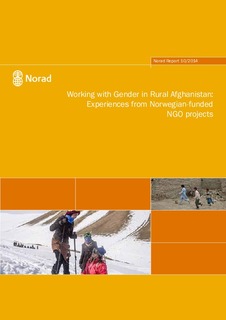| dc.description.abstract | Gender equality and women’s rights is a key priority for Norway’s foreign and development policy in general and in Afghanistan in particular. Gender considerations are included in most of Norway’s development cooperation in the country but the substance and scale of it varies from agreement to agreement and from the different channels of funding.
Non-governmental organisations (NGOs) constitute an important development cooperation channel for the Norwegian Embassy in Kabul. This study was commissioned by Norad upon request of the Embassy in order to review the gender aspects of six large rural development projects in Afghanistan, implemented by six NGOs. Agency for Technical Cooperation and Development (ACTED), Aga Khan Foundation (AKF), Danish Committee for Aid to Afghanistan (DACAAR), the Norwegian Afghanistan Committee (NAC), Norwegian Church Aid (NCA) and the Norwegian Refugee Council (NRC). The projects were supported by Norway between 2010 and 2013.
The study provides a light review of current literature on gender and development in Afghanistan, a discussion of how the six organisations conceptualised and prioritised gender and organised their interventions in order to achieve gender-related objectives, and an assessment of the relevance, sustainability and results of the NGOs’ gender work.
The study pays particular attention to women’s income generation projects as a way of examining the relevance, sustainability, results and promising practices of gender related activities. The review found interesting differences in how projects were conceived and implemented; to what extent they aimed and succeeded in expanding women’s control over the value chain, whether it was possible to mobilize women in small collectives with regular meetings and to what extent women were able to obtain a sustainable income.
Often, working through religious idioms and local leaders has been presented as one panacea, counterposed to an | |
